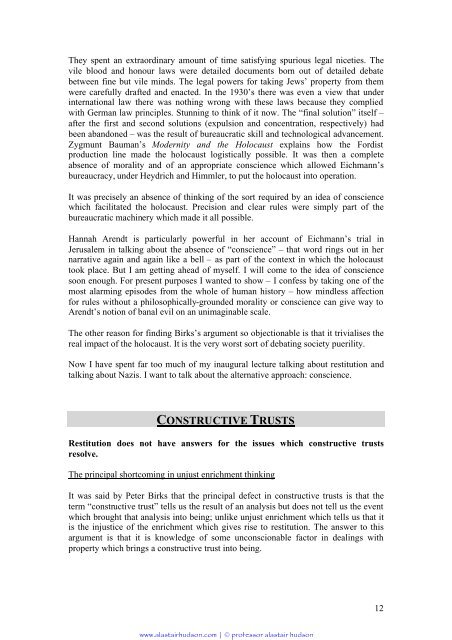England's dreaming equity, trust and conscience - alastairhudson.com
England's dreaming equity, trust and conscience - alastairhudson.com
England's dreaming equity, trust and conscience - alastairhudson.com
Create successful ePaper yourself
Turn your PDF publications into a flip-book with our unique Google optimized e-Paper software.
They spent an extraordinary amount of time satisfying spurious legal niceties. Thevile blood <strong>and</strong> honour laws were detailed documents born out of detailed debatebetween fine but vile minds. The legal powers for taking Jews’ property from themwere carefully drafted <strong>and</strong> enacted. In the 1930’s there was even a view that underinternational law there was nothing wrong with these laws because they <strong>com</strong>pliedwith German law principles. Stunning to think of it now. The “final solution” itself –after the first <strong>and</strong> second solutions (expulsion <strong>and</strong> concentration, respectively) hadbeen ab<strong>and</strong>oned – was the result of bureaucratic skill <strong>and</strong> technological advancement.Zygmunt Bauman’s Modernity <strong>and</strong> the Holocaust explains how the Fordistproduction line made the holocaust logistically possible. It was then a <strong>com</strong>pleteabsence of morality <strong>and</strong> of an appropriate <strong>conscience</strong> which allowed Eichmann’sbureaucracy, under Heydrich <strong>and</strong> Himmler, to put the holocaust into operation.It was precisely an absence of thinking of the sort required by an idea of <strong>conscience</strong>which facilitated the holocaust. Precision <strong>and</strong> clear rules were simply part of thebureaucratic machinery which made it all possible.Hannah Arendt is particularly powerful in her account of Eichmann’s trial inJerusalem in talking about the absence of “<strong>conscience</strong>” – that word rings out in hernarrative again <strong>and</strong> again like a bell – as part of the context in which the holocausttook place. But I am getting ahead of myself. I will <strong>com</strong>e to the idea of <strong>conscience</strong>soon enough. For present purposes I wanted to show – I confess by taking one of themost alarming episodes from the whole of human history – how mindless affectionfor rules without a philosophically-grounded morality or <strong>conscience</strong> can give way toArendt’s notion of banal evil on an unimaginable scale.The other reason for finding Birks’s argument so objectionable is that it trivialises thereal impact of the holocaust. It is the very worst sort of debating society puerility.Now I have spent far too much of my inaugural lecture talking about restitution <strong>and</strong>talking about Nazis. I want to talk about the alternative approach: <strong>conscience</strong>.CONSTRUCTIVE TRUSTSRestitution does not have answers for the issues which constructive <strong>trust</strong>sresolve.The principal short<strong>com</strong>ing in unjust enrichment thinkingIt was said by Peter Birks that the principal defect in constructive <strong>trust</strong>s is that theterm “constructive <strong>trust</strong>” tells us the result of an analysis but does not tell us the eventwhich brought that analysis into being; unlike unjust enrichment which tells us that itis the injustice of the enrichment which gives rise to restitution. The answer to thisargument is that it is knowledge of some unconscionable factor in dealings withproperty which brings a constructive <strong>trust</strong> into being.12www.<strong>alastairhudson</strong>.<strong>com</strong> | © professor alastair hudson













